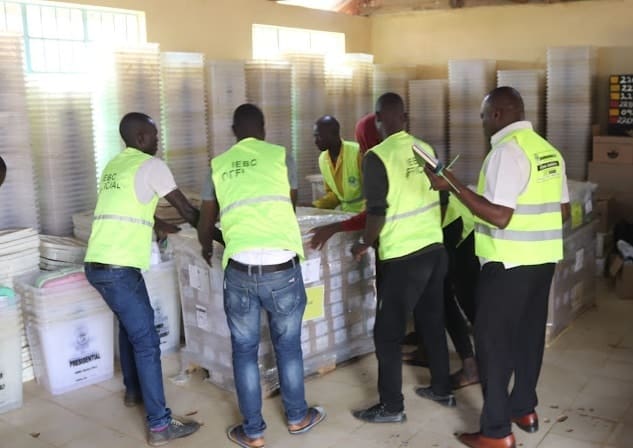
NAIROBI, Kenya, Mar 19 – The Independent Electoral and Boundaries Commission (IEBC) late on Tuesday evening filed its response to the petition lodged by the CORD alliance at the Supreme Court.
IEBC lawyers led by senior counsel Mohammed Nyaoga arrived at the court’s registry shortly before 8pm, just before the registry was to close for the day, accompanied by two IEBC commissioners and directors.
Nyaoga insisted that their application had adequately responded to the allegations by CORD and that it will be up to the Supreme Court to make a ruling.
He said: “We have answered all the issues raised; we have demonstrated that the election was carried out fairly and transparently. On our part, we are not going to engage in any public debate on the issue and we expect other parties to abide by that code.”
He also defended the inclusion of senior Counsel Ahmednasir Abdullahi in the IEBC defence team, saying that he was a counsel under oath and that he was not a party to the case.
Abdullahi has been on record criticising the autonomy of the IEBC in his commentary published in newspapers in which he said that the commission could not be trusted to conduct a credible election.
“The petition in court is not a petition that has been filed by or against Ahmednasir… he is not a party to the case; he took an oath to work as a lawyer without fear or favor and there are no personal issues that concern him,” he told journalists following a day long stakeout at the Supreme Court.
Other lawyers representing IEBC in the petition include Nani Mungai and Paul Nyamodi.
Prime Minster Raila Odinga who emerged second to Uhuru Kenyatta in the presidential election has accused the IEBC of altering the voter register to the extent that it was difficult to tell which register was finally used in the election.
He maintains that the motive behind the changed number of voters at the close of registration and at voting time was to give IEBC room to interfere with the presidential election.
Odinga is also alleging that IEBC abandoned the electronic voter identification process at the polling stations and release of results to lock out transparency in the process.
Also filed on Tuesday was a response by IEBC chairman Issack Hassan, who was named by CORD as the second respondent in the petition.
In his response filed by the Iseme, Kamau and Maema advocates, Hassan insisted that the election did not deviate from the normative procedures and that it was neither a sham nor a travesty.
Hassan maintained that the election was a success as it recorded a high turnout and was peaceful. He held that the petition failed to satisfy the evidential threshold to validate the assertions.
“The constitutional threshold for in validating a presidential election under Article 140 has not been met. A bare complaint cannot be the basis of nullifying a presidential election,” Hassan said.
He urged the court to put to consideration the public interest test, proportionality test and the harm test while reaching its determination on the matter, arguing that Odinga was advancing a narrow private right cleverly disguising it as public rights.
He pointed out that Odinga did not concede defeat in the elections of 1997, 2007 and 2013 and that it was not the business of the court to sympathise or empathise with the petitioner’s claims.
Hassan also pointed out that voter registration was conducted pursuant to the law and that Odinga participated in the process without raising any substantial objections.
Meanwhile, Odinga has filed another application seeking that the IEBC is ordered to provide (within 24 hours of the order) information that will facilitate and audit into the commissions’ Information Technology systems used in the election.
The Supreme Court is expected to convene on Wednesday morning for a mention of all petitions filed against the presidential election.
The court is set to give direction on how the cases will proceed.
Source-capitalfm.co.ke







